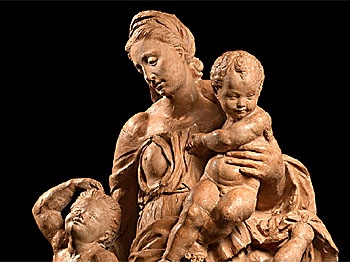NEW YORK—With the launch of their first collaborative exhibit “Body and Soul: Masterpieces of Renaissance and Baroque Sculpture” at Moretti Fine Art, opening Oct. 21, two renowned Renaissance and Baroque fine art specialists, Andrew Butterfield and Fabrizio Moretti join a growing number of important galleries and museums that have recently mounted exhibitions focusing on Old Master sculpture.
The Body and Soul exhibit is a group of twelve rare masterpieces of Italian sculpture, which are on view for the first time.
The works that Butterfield and Moretti have acquired for this exhibition, all museum quality, including sculptures by Riccio (the subject of a recent exhibition at the Frick Collection), Verrocchio (Leonardo da Vinci’s teacher) and Algardi, achieve not only the outer appearance but also the inner life of the figures they represent, hence the exhibition’s title, “Body and Soul.”
“Over the past few years, we have made significant discoveries, which exemplify the genius and beauty of Italian sculpture,” said Fabrizio Moretti, owner of a Florence based fine art gallery, and London-based Moretti Fine Art Ltd.
The Body and Soul exhibit is a group of twelve rare masterpieces of Italian sculpture, which are on view for the first time.
The works that Butterfield and Moretti have acquired for this exhibition, all museum quality, including sculptures by Riccio (the subject of a recent exhibition at the Frick Collection), Verrocchio (Leonardo da Vinci’s teacher) and Algardi, achieve not only the outer appearance but also the inner life of the figures they represent, hence the exhibition’s title, “Body and Soul.”
“Over the past few years, we have made significant discoveries, which exemplify the genius and beauty of Italian sculpture,” said Fabrizio Moretti, owner of a Florence based fine art gallery, and London-based Moretti Fine Art Ltd.






